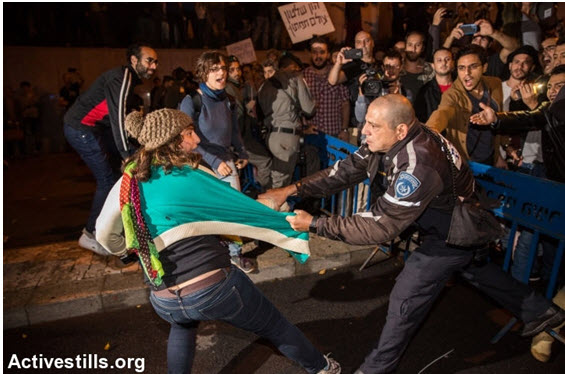The Association for Civil Rights in Israel (ACRI) petitioned the Supreme Court to order police to stop demanding that applicants who request licenses to conduct protests bear criminal responsibility for any violation by demonstrators.
The petition was filed together with four activists who are involved in organizing protests against the gas privatization deal across Israel – Adi Peled and Itamar Parchi from Tel Aviv, Alon Visser from Be’er Sheva and Naama Lezimi from Haifa.
ACRI claimed that the police have no authority to impose this as a condition for obtaining a license to demonstrate and that this amounts to a violation of the freedoms of assembly and speech. Courts have ruled many times that the responsibility for ensuring public order at demonstrations rests exclusively on the police, and this responsibility cannot be transfer to protesters. Furthermore, the organizers of the demonstrations cannot be made to guarantee that all participants in the demonstration behave in accordance with the law.

Police arrest an activist during a protest against the privatization of natural gas in Tel Aviv, November 7, 2015. (Photo: Activestills)
Apart from the illegal conditions being imposed on organizers of protests, the police have recently started criminal proceedings against applicants for licenses on suspicion of disorderly conduct by other demonstrators. For example, the organizers of protests in Tel Aviv and Be’er Sheva, who were not even present at the protest at the time of the ensuing riots, were summoned to investigations and restraining orders were issued against them. ACRI claims that even if the organizers had been present, it would not have been their responsibility to maintain public order. In some cases, police demands that this be a condition of obtaining a license to protest led to the cancellation of planned demonstrations. For example, a planned demonstration in Kiryat Shmona was cancelled because the organizers were reluctant to sign the formal request which included a clause requiring them to accept criminal responsibility, after learning about the abuse experienced by other organizers. In only one case on 23 November in Tel Aviv, an activist negotiated with police and managed to get a license without agreeing to this condition.
“The police convey a message that anyone who dares exercise their right to protest is being targeted. Consequently activists will be intimidated and not organize demonstrations for fear of what awaits them. It is clear that continuing this condition is not permissible as organizers have no practical way of guaranteeing the behavior of all participants in a demonstration. It is the police’s role to assist the organizers of demonstrations to exercise their rights and not to put unnecessary obstacles in their way,” explained Attorney Sharona Eliahu-Chai, an expert on the freedom of expression and demonstration at ACRI.


